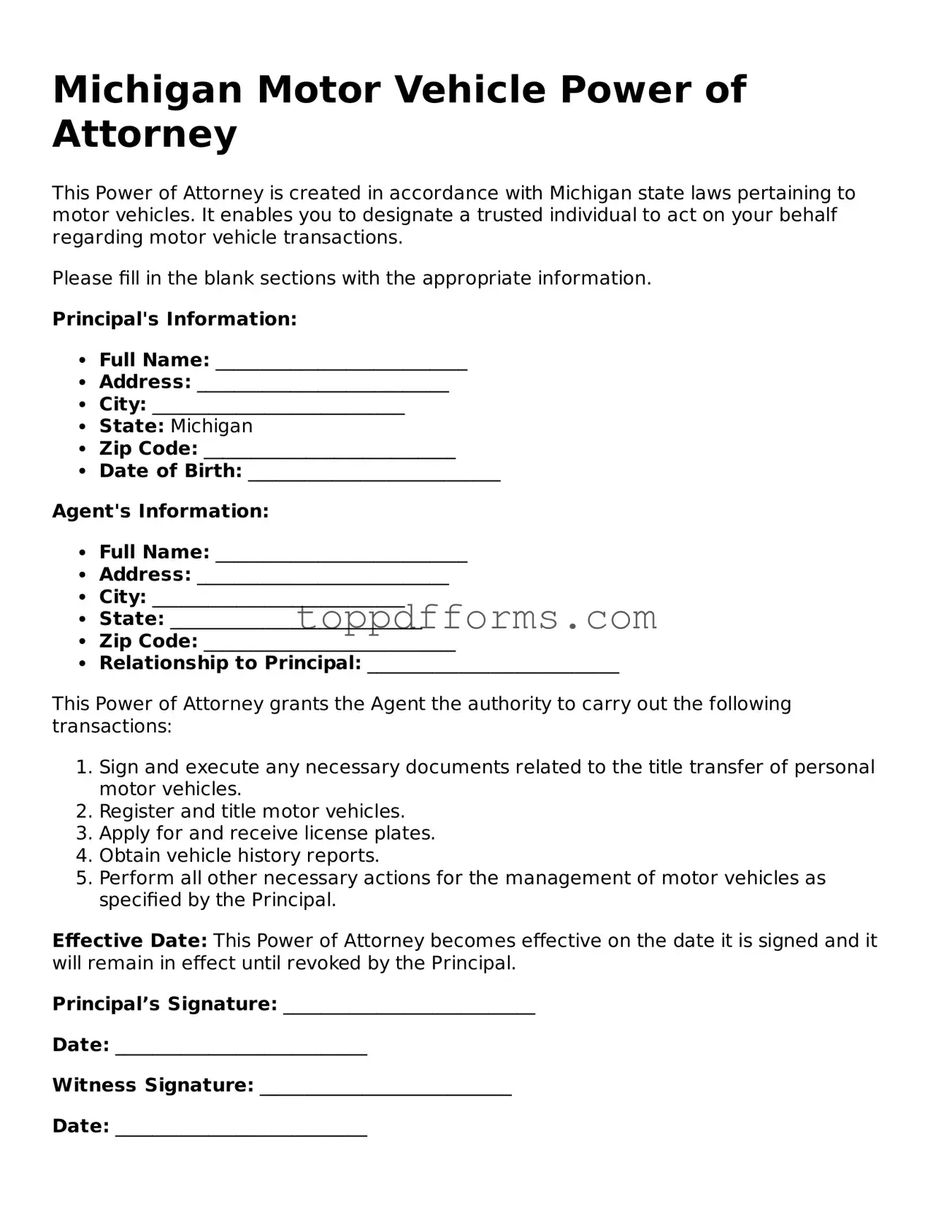Motor Vehicle Power of Attorney Document for Michigan State
Things You Should Know About This Form
What is a Michigan Motor Vehicle Power of Attorney form?
The Michigan Motor Vehicle Power of Attorney form is a legal document that allows an individual (the principal) to designate another person (the agent) to act on their behalf regarding motor vehicle transactions. This includes tasks such as transferring ownership, registering a vehicle, or applying for a title. It is particularly useful when the principal is unable to attend to these matters in person.
Who can be appointed as an agent in this form?
Any adult individual can be appointed as an agent. This can be a family member, friend, or even a professional service. It is essential that the chosen agent is trustworthy, as they will have the authority to make decisions regarding the principal's motor vehicle matters.
How do I complete the Michigan Motor Vehicle Power of Attorney form?
To complete the form, you will need to provide specific information, including the name and address of both the principal and the agent, details about the vehicle involved, and the powers being granted. Ensure that all information is accurate. After filling out the form, both parties should sign it, and it may be advisable to have it notarized to enhance its legal validity.
Is notarization required for the form to be valid?
While notarization is not strictly required, it is highly recommended. Having the form notarized can help prevent disputes and provide additional assurance that the document is legitimate. Some institutions may require notarization before accepting the power of attorney for motor vehicle transactions.
Can I revoke the Michigan Motor Vehicle Power of Attorney?
Yes, the principal has the right to revoke the power of attorney at any time, as long as they are mentally competent. To revoke it, a written notice should be provided to the agent and any relevant parties. It is advisable to complete a formal revocation form and ensure that it is properly executed to avoid confusion.
What happens if the principal becomes incapacitated?
If the principal becomes incapacitated, the power of attorney remains in effect unless it is revoked. However, it is essential to ensure that the agent is aware of the principal's wishes and can act in their best interest. It may be beneficial to discuss the principal's intentions with the agent beforehand.
Where can I obtain the Michigan Motor Vehicle Power of Attorney form?
The form can typically be obtained from the Michigan Secretary of State's website or local branch offices. Additionally, many legal service providers offer templates that comply with Michigan law. It is important to ensure that you are using the most current version of the form to avoid any issues.
PDF Overview
| Fact Name | Description |
|---|---|
| Purpose | The Michigan Motor Vehicle Power of Attorney form allows an individual to appoint another person to act on their behalf in matters related to motor vehicle transactions. |
| Governing Law | This form is governed by the Michigan Vehicle Code, specifically MCL 257.233. |
| Signature Requirement | The form must be signed by the principal (the person granting authority) in the presence of a notary public. |
| Duration | The power of attorney remains in effect until revoked by the principal or until the specific transaction is completed. |
Common mistakes
Filling out the Michigan Motor Vehicle Power of Attorney form can be a straightforward process, but many people make common mistakes that can lead to complications. One frequent error is failing to provide complete information about the vehicle. The form requires specific details, including the vehicle identification number (VIN), make, model, and year. Omitting any of this information can render the document invalid, causing delays in transferring ownership or handling vehicle-related matters.
Another mistake often made is not signing the form correctly. The Power of Attorney must be signed by the principal, the person granting authority, and sometimes also requires a witness or notary signature. In some cases, individuals forget to sign altogether or fail to have the document notarized when required. This oversight can result in the form being rejected by the Department of Motor Vehicles (DMV).
People also frequently overlook the importance of specifying the powers granted to the agent. The form should clearly outline what the agent can do on behalf of the principal. If the language is vague or if certain powers are not explicitly stated, the agent may not have the authority to perform necessary actions, such as selling the vehicle or transferring title. Clarity is key to ensuring that the agent can act effectively.
Lastly, many individuals neglect to keep a copy of the completed form. Once the Power of Attorney is filled out and submitted, having a personal copy is essential for reference. Without it, the principal may find it difficult to verify what powers were granted or to address any disputes that arise later. Keeping a record helps ensure that everyone involved is on the same page and can prevent misunderstandings down the line.
Other Common State-specific Motor Vehicle Power of Attorney Forms
Power of Attorney Form for Vehicle - Designating a representative can help avoid delays in processing vehicle transactions.
Ohio Bmv Power of Attorney Form 3771 - Make appointments for vehicle-related affairs easier to manage.
Mv1l - Delegate authority for motor vehicle affairs seamlessly with the use of this Power of Attorney form.
By utilizing the proper documentation, such as the Texas Real Estate Purchase Agreement form, buyers and sellers can ensure clarity throughout the transaction process, making it essential for anyone involved in real estate deals in Texas. For easy access to necessary templates, you can find helpful resources and forms at PDF Templates.
Texas Motor Vehicle Bill of Sale - Streamlines the process of dealing with local vehicle licensing agencies.
